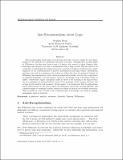Anti-exceptionalism about logic
Abstract
Anti-exceptionalism about logic is the doctrine that logic does not require its own epistemology, for its methods are continuous with those of science. Although most recently urged by Williamson, the idea goes back at least to Lakatos, who wanted to adapt Popper's falsificationism and extend it not only to mathematics but to logic as well. But one needs to be careful here to distinguish the empirical from the a posteriori. Lakatos coined the term 'quasi-empirical' for the counterinstances to putative mathematical and logical theses. Mathematics and logic may both be a posteriori, but it does not follow that they are empirical. Indeed, as Williamson has demonstrated, what counts as empirical knowledge, and the role of experience in acquiring knowledge, are both unclear. Moreover, knowledge, even of necessary truths, is fallible. Nonetheless, logical consequence holds in virtue of the meaning of the logical terms, just asconsequence in general holds in virtue of the meanings of the concepts involved; and so logic is both analytic and necessary. In this respect, it is exceptional. But its methodology and its epistemology are the same as those of mathematics and science in being fallibilist, and counterexamples to seemingly analytic truths are as likely as those in any scientific endeavour. What is needed is a new account of the evidential basis of knowledge, one which is, perhaps surprisingly, found in Aristotle.
Citation
Read , S L 2019 , ' Anti-exceptionalism about logic ' , The Australasian Journal of Logic , vol. 16 , no. 7 , 6 , pp. 298-318 . https://doi.org/10.26686/ajl.v16i7.5926
Publication
The Australasian Journal of Logic
Status
Peer reviewed
ISSN
1448-5052Type
Journal article
Collections
Items in the St Andrews Research Repository are protected by copyright, with all rights reserved, unless otherwise indicated.

